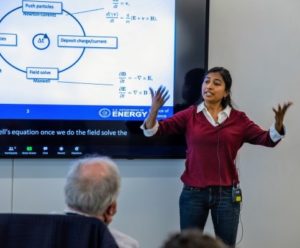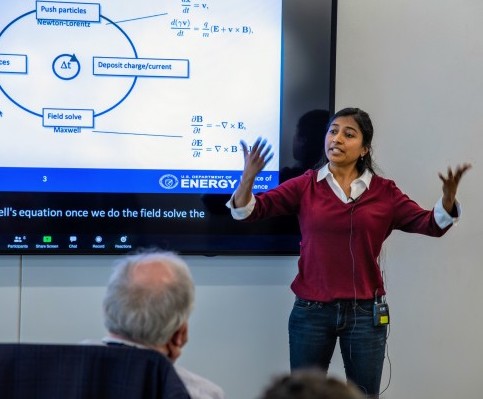
Postdoc Revathi Jambunathan talks about modeling pulsar magnetospheres with a software called WarpX. (Photo by Margie Wylie, Berkeley Lab)
Twenty-two postdoctoral fellows from across the Computing Sciences Area shared the status of their current projects at the first CSA Postdoc Symposium, held January 30-31 at Berkeley Lab. Their presentations covered a broad range of research topics, including code optimization, machine/deep learning, network routing, modeling and simulation of complex scientific problems, exascale, and other next-generation computer architectures.
This Postdoc Symposium is a great reminder about just how much excellent work is being done by postdocs in our organization, and how diverse that work is,” said Ann Almgren, group lead of Berkeley Lab’s Center for Computational Sciences and Engineering (CCSE), which fielded 10 of the 22 postdocs who presented at the event. “Postdocs are absolutely essential to our work in CCSE – they work on everything from basic research into mesoscale systems to six different Exascale Computing Project projects in fields ranging from astrophysics and combustion to optimization strategies in high energy physics and water resources.”
The symposium was designed to provide the postdocs with communications training, mentorship, and coaching sessions, plus an opportunity to present their research in a public forum, according to David Brown, director of the Computational Research Division, who organized the event. The participants worked with their mentors over several weeks, receiving feedback and pointers on their presentations. Their talks were videotaped to provide additional review opportunities.
By going through this process to prepare my talk, I learned about how to convey my ideas and work to a general audience efficiently,” said Jangho Park, a CCSE postdoc whose talk focused on input structure selection for time-series prediction with machine learning. “And with the video, I was able to gain knowledge about good and bad habits of these kinds of presentations and objectively review my talk.”
CCSE postdoc Reva Jambunathan, whose talk was on exascale modeling of pulsar magnetospheres using the WarpX code, appreciated the slide laydown and dry run leading up to the event and thinks CSA should hold similar educational events for postdocs in the future. “We learned a lot of useful tips for giving a talk to a general audience, especially for project reviews and for new solicitations,” she said.
The Postdoc Symposium is an outgrowth of the CS Postdoc Coordination Program, Brown noted. Begun in 2014 and organized by CRD’s Bert de Jong, the coordination program consists of biweekly events, talks by CSA and NESAP postdocs and group leads, and presentations on broader science engagement and skill development.
Source: Kathy Kincade at Berkeley Lab




